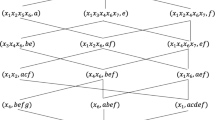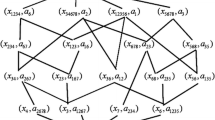Abstract
Incomplete contexts are a kind of formal contexts in which information about the relationship between some objects and attributes is not available or is lost. Knowledge discovery in incomplete contexts is of interest because such databases are frequently encountered in the real world. The existing work has proposed an approach to construct the approximate concept lattice of an incomplete context. Generally speaking, however, the huge nodes in the approximate concept lattice make the obtained conceptual knowledge difficult to be understood and weaken the efficiency of the related decision-making analysis as well. Motivated by this problem, this paper puts forward a method to compress the approximate concept lattice using K-medoids clustering. To be more concrete, firstly we discuss the accuracy measure of approximate concepts in incomplete contexts. Secondly, the similarity measure between approximate concepts is presented via the importance degrees of an object and an attribute. And then the approximate concepts of an incomplete context are clustered by means of K-medoids clustering. Moreover, we define the so-called K-deletion transformation to achieve the task of compressing the approximate concept lattice. Finally, we conduct some experiments to perform a robustness analysis of the proposed clustering method with respect to the parameters \(\varepsilon\) and K, and show the average rate of compression of approximate concept lattice.


Similar content being viewed by others
Explore related subjects
Discover the latest articles, news and stories from top researchers in related subjects.References
Wille R (1982) Restructuring lattice theory: an approach based on hierarchies of concepts. In: Rival I (ed) Ordered sets. Reidel, Dordrecht, pp 445–470
Ganter B, Wille R (1999) Formal concept analysis: mathematical foundations. Springer, New York
Zhang WX, Qiu GF (2005) Uncertain decision making based on rough sets. Tsinghua University Press, Beijing
Zhang WX, Yao YY, Leung Y (2006) Rough set and concept lattice. Xi’an Jiaotong University Press, Xi’an
Ganter B, Stumme G, Wille R (2005) Formal concept analysis, foundations and applications. Springer, Berlin
Godin R (1995) Incremental concept formation algorithm based on Galois (concept) lattices. Comput Intell 11(2):246–267
Kuznetsov SO, Obiedkov SA (2002) Comparing performance of algorithms for generating concept lattices. J Exp Theor Artif Intell 14:189–216
Krajca P, Outrata J, Vychodil V (2010) Parallel algorithm for computing fixpoints of Galois connections. Ann Math Artif Intel 59:257–272
Wille R (2002) Why can concept lattices support knowledge discovery in databases. J Exp Theor Artif Intell 14(2–3):81–92
Yao YY (2004) A comparative study of formal concept analysis and rough set theory in data analysis. In: Proceedings of 4th International Conference on rough sets and current trends in computing. Uppsala, Sweden, pp 59–68
Wang LD, Liu XD (2008) Concept analysis via rough set and AFS algebra. Inf Sci 178:4125–4137
Li JH, Mei CL, Cherukuri AK, Zhang X (2013) On rule acquisition in decision formal contexts. Int J Mach Learn Cybern 4:721–731
Shao MW, Yang HZ (2013) Two kinds of multi-level formal concepts and its application for sets approximations. Int J Mach Learn Cybern 4:621–630
Carpineto C, Romano G (2004) Exploiting the potential of concept lattices for information retrieval with CREDO. J Univers Comput Sci 10(8):985–1013
Snelting G (1996) Reengineering of configurations based on mathematical concept analysis. ACM Trans Softw Eng Methodol 5(2):146–189
Zhang WX, Wei L, Qi JJ (2005) Attribute reduction theory and approach to concept lattice. Sci China Ser F 48(6):713–726
Aswani Kumar CH, Srinivas S (2010) Concept lattice reduction using fuzzy K-means clustering. Expert Syst Appl 37(3):2696–2704
Dias SM, Vieira NJ (2010) Reducing the size of concept lattices: the JBOS approach. In: Proceedings of the Seventh International Conference on concept lattices and their applications, pp 80–91
Stumme G, Taouil R, Bastide Y et al (2002) Computing iceberg concept lattices with TITANIC. Data Knowl Eng 42:189–222
Oosthuizen GD (1994) The application of concept lattices to machine learning. University of Pretoria, South Africa
Li TJ, Wu WZ (2011) Attribute reduction in formal contexts: a covring rough set approach. Fund Inf 111:15–32
Mi JS, Leung Y, Wu WZ (2010) Approaches to attribute reduction in concept lattices induced by axialities. Knowl Based Syst 23:504–511
Wei L, Qi JJ (2010) Relation between concept lattice reduction and rough set reduction. Knowl Based Syst 23:934–938
Liu M, Shao MW, Zhang WX, Wu C (2007) Reduction method for concept lattices based on rough set theory and its application. Comput Math Appl 53(9):1390–1410
Wu WZ, Leung Y, Mi JS (2009) Granular computing and knowledge reduction in formal contexts. IEEE Trans Knowl Data Eng 21(10):1461–1474
Burmeister P, Holzer R (2000) On the treatment of incomplete knowledge in formal concept analysis. In: Conceptual structures: logical, linguistic, and computational issues. Springer, Berlin, Heidelberg, pp 385–398
Li JH, Mei CL, Lv YJ (2013) Incomplete decision contexts: approximate concept construction, rule acquisition and knowledge reduction. Int J Approx Reason 54(1):149–165
Liang JY, Xu ZB (2002) The algorithm on knowledge reduction in incompete information systems. Int J Uncertain Fuzz Knowl Based Syst 10(1):95–103
Wang LD, Liu XD (2008) A new model of evaluating concept similarity. Knowl Based Syst 21:842–846
Wang LD, Gong DX (2010) A structural information method for evaluating concept similarity. In: Seventh International Conference on fuzzy systems and knowledge discovery. IEEE press, pp 1966–1970
Slowinski R, Vanderpooten D (1997) Similarity relation as a basis for rough approximations. ICS Research Report 53/95, Warsaw University of Technology, Warsaw, 1995. In: Wang PP (ed) Advances in machine intelligence and soft-computing, vol IV. Duke University Press, Durham, pp 17–33
Li JH, Mei CL, Lv YJ (2011) A heuristic knowledge-reduction method for decision formal contexts. Comput Math Appl 61(4):1096–1106
Qian YH, Liang JY, Dang CY (2010) MGRS: a multi-granulation rough set. Inf Sci 180:949–970
Yeung DS, Wang XZ (2002) Improving performance of similarity-based clustering by feature weight learning. IEEE Trans Pattern Anal 24(4):556–561
Wang XZ, Wang YD, Wang LJ (2004) Improving fuzzy c-means clustering based on feature-weight learning. Pattern Recogn Lett 25(10):1123–1132
Deng NY, Tian YJ (2009) Support vector machines-theory algorithm and expand. Science Press, Beijing
Hitendra Sarma T, Viswanath P, Eswara Reddy B (2013) A hybrid approach to speed-up the k-means clustering method. Int J Mach Learn Cybern 4(2):107–117
Rana S, Jasola S, Kumar R (2013) A boundary restricted adaptive particle swarm optimization for data clustering. Int J Mach Learn Cybern 4(4):391–400
Arthur D, Vassilvitskii S (2007) K-means++: the advantages of careful seeding. In: Proceedings of the Eighteenth Annual ACM-SIAM Symposium on discrete algorithms, society for industrial and applied mathematics, Philadelphia, pp 1027–1035
Kaufman L, Rousseeuw PJ (1990) Finding groups in data: an introduction to cluster analysis. Wiley, New York
Park HS, Jun CH (2009) A simple and fast algorithm for K-medoids clustering. Expert Syst Appl 36(2):3336–3341
Wang X (2008) Research on reduction theory and approaches to concept lattices. Xi’an Jiaotong University Press, Xi’an
Frank A, Asuncion A (2010) UCI machine learning repository. University of California, School of Information and Computer Science, Irvine. http://archive.ics.uci.edu/ml
Dunn JC (1973) A fuzzy relative of the ISODATA process and its use in detecting compact well-separated clusters. J Cybern 3(3):32–57
Wen Y, Xiao MQ, Wang YD, Qu DP (2013) Diagnostic rule acquisition from incomplete information based on concept lattices. J Vib Meas Diagn 33(5):886–891 (in Chinese)
Acknowledgments
The authors would like to thank Editor-in-Chief and three anonymous reviewers for their valuable comments and helpful suggestions which lead to a significant improvement on the manuscript. This work was supported by the National Natural Science Foundation of China (Nos. 61305057 and 11371014) and the Natural Science Research Foundation of Kunming University of Science and Technology (No. 14118760).
Author information
Authors and Affiliations
Corresponding author
Rights and permissions
About this article
Cite this article
Li, C., Li, J. & He, M. Concept lattice compression in incomplete contexts based on K-medoids clustering. Int. J. Mach. Learn. & Cyber. 7, 539–552 (2016). https://doi.org/10.1007/s13042-014-0288-3
Received:
Accepted:
Published:
Issue Date:
DOI: https://doi.org/10.1007/s13042-014-0288-3




